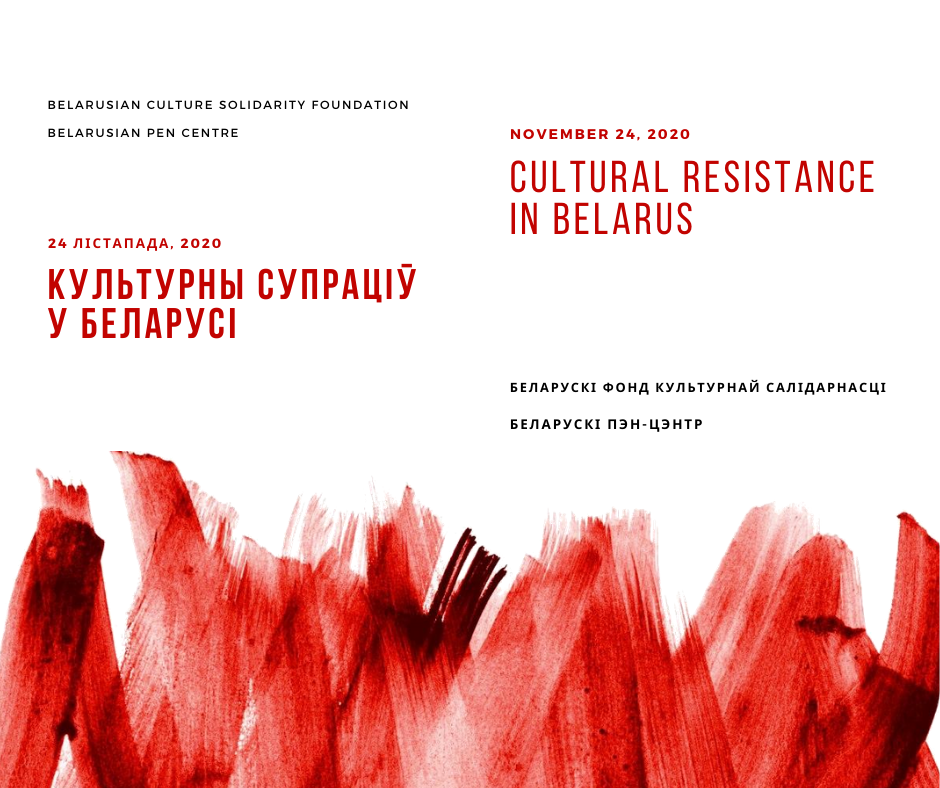
Arrests
Aleś Harbul, a poet and local history expert, held a single-person picket against the violence in Pastavy on 15 November and was detained. On November 18, the Pastavy court issued a warning to him.
Taras Kruckich, journalist and film critic, member of the BelarusDocs festival detained on November 15, was sentenced to 25 days of arrest.
Ilia Jasinski, an actor of the Republican Theatre of Belarusian Drama, was beaten severely during his detention on November 15 and hospitalized with a broken spine.
Makśim Karžycki, actor of the Yakub Kolas National Academic Drama Theater, was detained on November 17 for participating in a solidarity action in memoriam Raman Bandarenka and sentenced to 10 days of arrest on November 20.
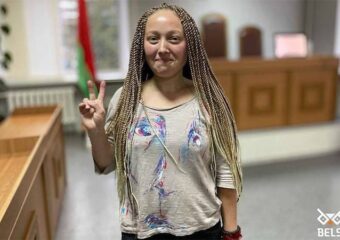
Volha Śemčanka, head of the Literary and Drama Department of the Mahileŭ Theater, and manager of the Belarusian Folk Dance Club, has been detained for participating in a march in memory of Raman Bandarenka on November 15 in Mahilieŭ.
Earlier, Volha was prosecuted twice for participating in unauthorized mass events.
Edward Dmuhoŭsky, a well-known local history expert, tour guide and public activist, was sentenced to 10 days of administrative arrest for participating in a rally in memory of Raman Bandarenka on November 15.
Alaksandr Sakałoŭ, sculptor detained on November 15, received 15 days of arrest.
 Vadźim Dzmitranok, a well-known architect and former member of Viktar Babaryka’s initiative group, was detained and severely beaten on November 15. He is now in hospital with a closed-head injury, numerous hematomas and possibly severe damage to the internal organs.
Vadźim Dzmitranok, a well-known architect and former member of Viktar Babaryka’s initiative group, was detained and severely beaten on November 15. He is now in hospital with a closed-head injury, numerous hematomas and possibly severe damage to the internal organs.
He is being guarded by a convoy, as he is now a suspect under Article 342 of the Criminal Code of the Republic of Belarus – the organization of group actions, grossly violating public order and involving obvious disobedience to the legitimate demands of the authorities (punished with a fine, or arrest, or restriction of liberty for a term of up to three years, or imprisonment for the same term).
Michaś Mišuk, the artist who created some of the first street art in Kastryčnitskaja, one of the most creative streets in Minsk, received 13 days of arrest.
Dźianis Waronski and Alaksandr Škiranda, the buskers detained near the Yakub Kolas Square metro station in Minsk on November 20, received 12 and 13 days of administrative arrest for “participating in a cultural and entertainment event without the permission of the Minsk City Executive Committee.”
Detained in Minsk during the march of the districts on November 22:
Illa Čarapko-Samachwalaŭ, actor, leader of the bands “Petlya Prestrastiya” and “Cassiopeia” (received 15 days of arrest); Ćimur Reiźis, keyboardist for Addis Abeba band and Sergey Pukst’s projects (received 13 days of arrest); Jauhen Junaŭ, photographer, member of the renowned art group “Belarusian Climate”, a legend of the Belarusian advertising market.
Pressure and Dismissal, Strikes
Pressure on the Men’s Choral Group Uniya has continued. Three members of the choral group have faced imprisonment for now, and the leading soloist Aliaksandr Šyk’s wife Maryna was also detained and fined. Now the couple is threatened to have their seventeen-year-old adopted son taken away.
Mikałai Stońka, an actor of the Republican Theater of Belarusian Drama, quit the theatre and recorded a video appeal condemning the pressure on the theater and unprecedented violence in the country.
12 employees of the New Theater in Minsk had to quit, some by their own decision, other under pressure of the director, after their strike was found illegal in the court. By the order from the authorities, no other state theatre in Belarus is allowed to hire the actors.
Jaŭhien Malikaŭ, a writer and art critic from Mahileŭ, author of the book “Traditions of carved decor in the folk architecture of south-eastern Belarus (late 19th – first half of the 20th century)” was fired from Belarusian State University of Transport, where he worked for 16 years, for his active civil position.
Three specialists of the Center for Experimental Directing of the Academy of Arts informed the rector about the beginning of the strike on November 20. In response, the dean warned that most likely, their Center for Experimental Directing will be disbanded.
Open Letter from Belarusian Writers
200 Belarusian writers, including Svetlana Alexievich, Volha Šparaha, Dzmitry Strocaŭ, Taciana Niadbaj, have signed a letter to the authorities, heads of state structures, and officials demanding to put an end to mass repressions and attacks on the people who want change, to admit their defeat and accept the will of the people!
For the original letter with signatories list, follow the link.
Cultural Resistance
Despite dispersals and detentions, people continue to organize activities in their neighbourhoods. Armed riot police arrived at the gig in Sucharawa district of Minsk on November 19. The musicians managed to escape, but the security officers confiscated the equipment and donations that residents made to thank the musicians.
Hanna Šarkunova, a Belarusian singer, has dedicated a touching song to Raman Bandarenka who fell victim of the regime on November 12.
A charity online concert in solidarity with Men’s Choral Group Uniya took place on 21 November. All the funds raised will be directed to support the choral group. Follow the link to donate.
Students of the Academy of Arts made a performance in memory of Raman Bandarenka on November 20.
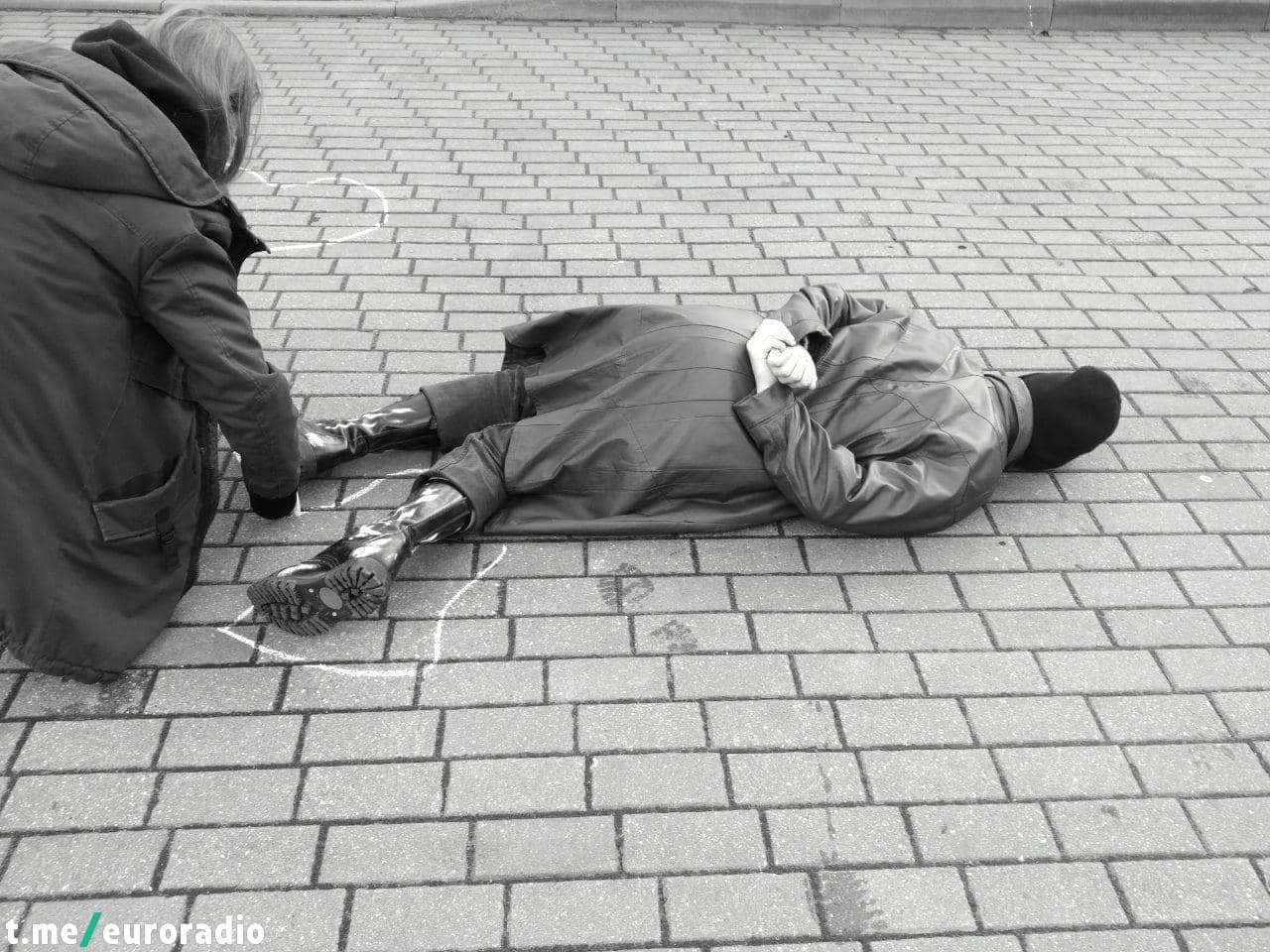
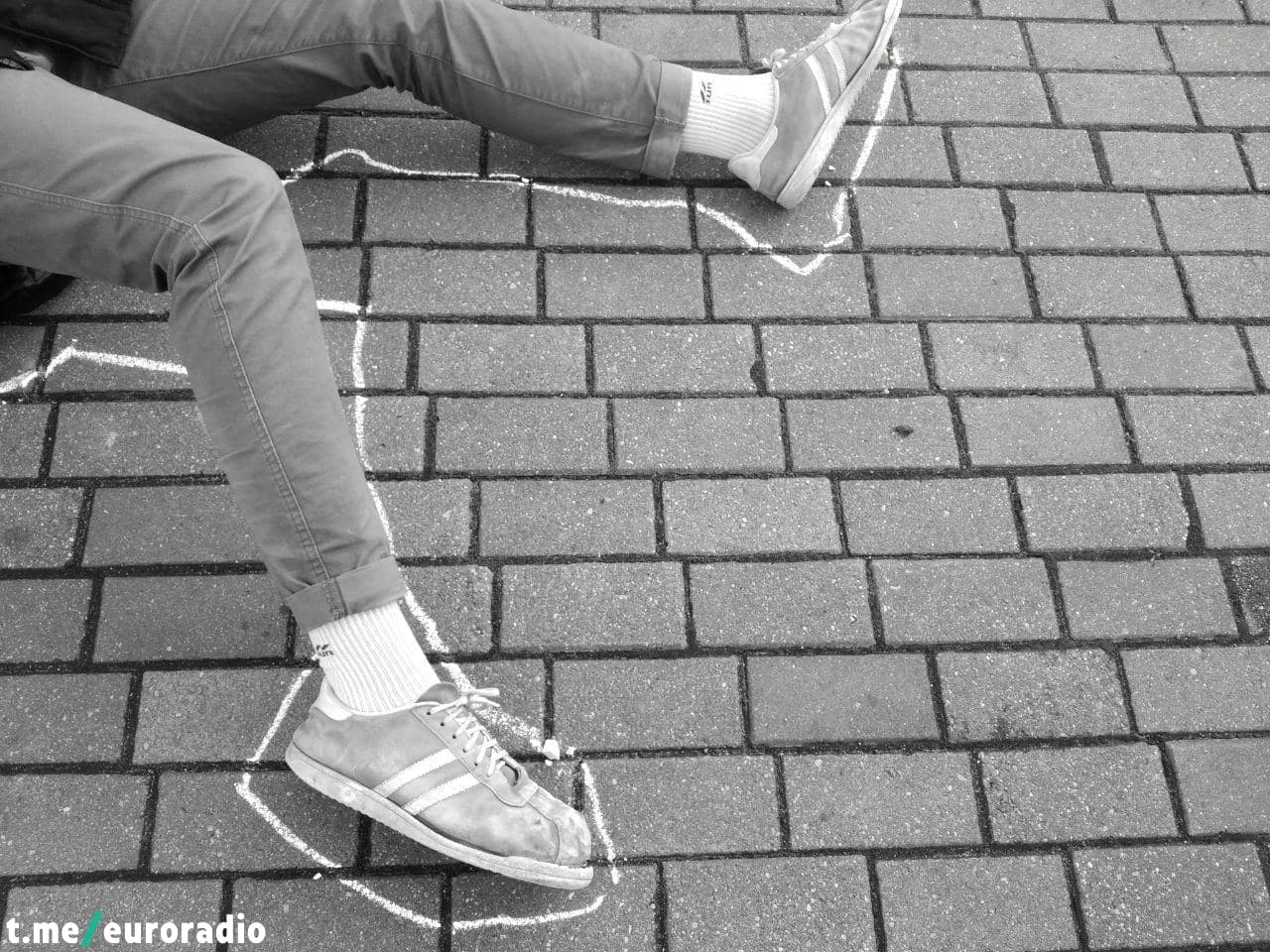
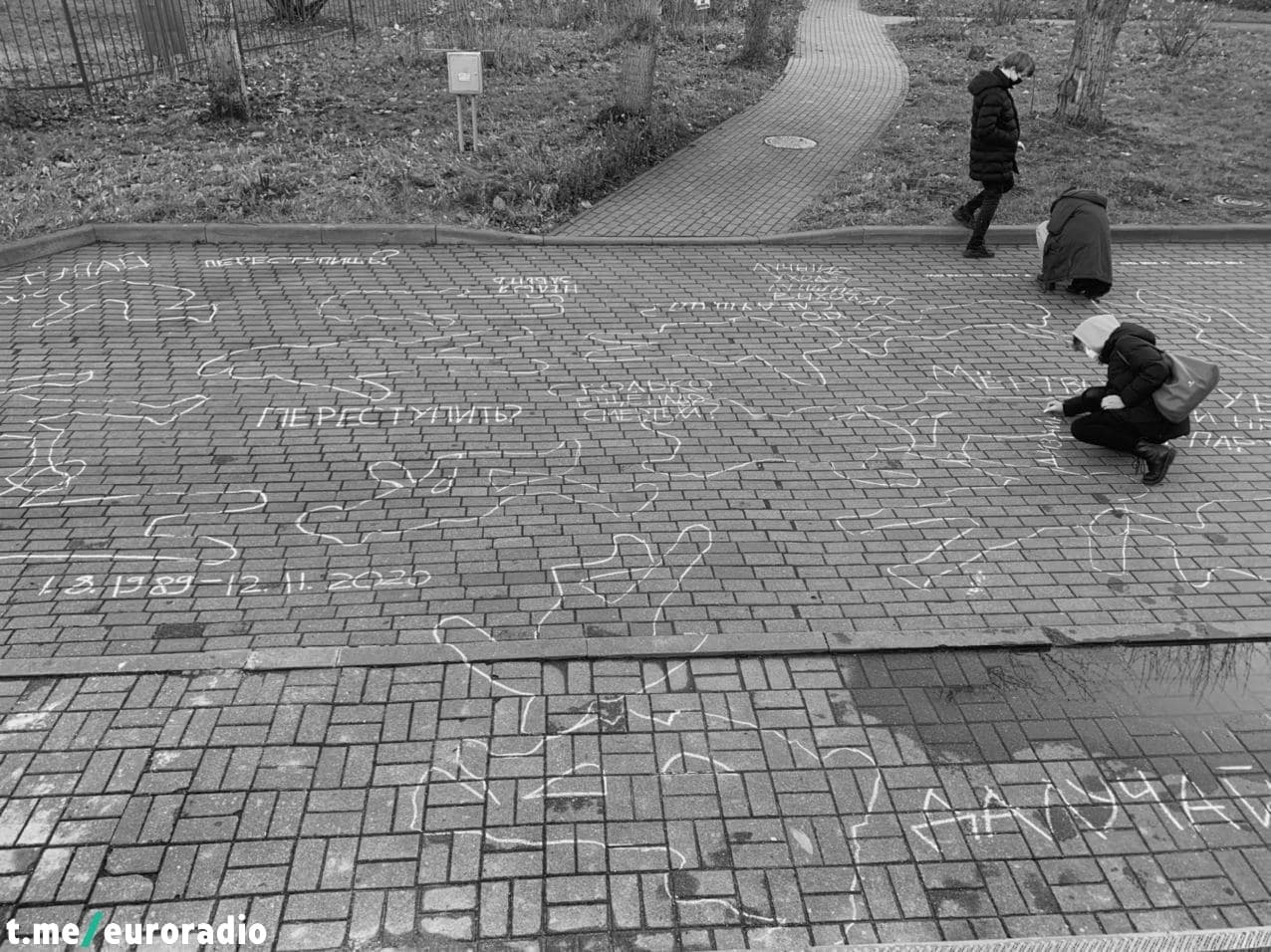
Photo by Euroradio
Voice of Belaurusian Culture

Ilia Jasinski, an actor of the Republican Theatre of Belarusian Drama, was beaten severely during his detention on November 15 and hospitalized. He’s been diagnosed with broken processes of two vertebrae. Ilia will have to spend the next 5-7 days in the hospital, and the fractures should heal in 1.5-2 months. In solidarity with their colleague, actors of the theatre put an empty chair in place of Ilia’s character in their new show “Dr. Raus (“Raus” stands for ‘district police department’) where he was supposed to play.
“You can break the spine, but you won’t break the spirit,” Ilia says.
Mikałaj Chalezin [Nikolai Khalezin], a co-artistic director of Belarus Free Theatre, playwright and journalist, on economic sanctions and various formats of peaceful protest.
“External pressure is essential. There is internal pressure from the people’s side on the regime, and there is external pressure. If they are not in sync, there is a disbalance in one direction or the other. Imagine some official from Europe sit and watch grenades explode and people shot in Belarus… It would be wrong. Things take time, and that’s also true for coordination, restructuring, and pressure.”
See the original interview in Belarusian and Russian.
Musicians from the fantasy folk band Irdorath who play bagpipes at the peaceful rallies and were fired for it.
“In general, our work is abstract and has never been social. It was our way to escape from the gray reality into the world of Slavic fantasy, medieval legends, and folk songs. But it feels wrong to be escaping from the reality of Belarus now .”
Mikałaj Stońka and Andrej Novik, actors who quit the RTBD in protest.
Mikałaj Stońka, “The Ministry of Culture has always censored the theater, but after the election the pressure increased. We fought it as best we could, but the situation was getting worse. While we were coming up with ways to express our civil position, like “artistic” signs of solidarity in performances or bows, and the audience understood them, they were banned one after another. I realized I couldn’t go on stage and do nothing at all. Speaking to the officials from the Ministry of Culture would be a bargain with my conscience, even if I spoke the truth outside the walls of the theater and everyone anyway knows I’m not a Lukashenka’s follower.”
Andrej Novik, “When your colleague has been beaten so badly [ref. Illia Jasinski], it’s a shame to go on stage, even if it’s a show you play in solidarity with him. I think the theater should have said, ‘No! We won’t work’, although I know that everyone there is doing what they can for the victory.”
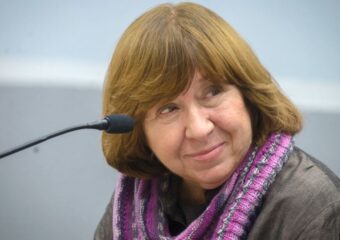
Svetlana Alexievich, a writer, Nobel Prize Laureate, and President of PEN Belarus, in her interview to Radio Free Europe/Radio Liberty shared her thoughts on Belarusian protests and the existential problems of the Belarusian revolution.
“Any ‘thaw’, any leap forward is impossible to roll back completely, it’s impossible to return to the past. People don’t want to live as they lived before 1990, and they won’t. People want to travel the world, they want for their children to study anywhere in the world. Young people, when you tell them about that life we had, simply can’t believe it. But that’s how we lived, quite recently. It still leaves a mark and causes consequences.
Were it not for Khrushchev’s “thaw,” there would have been no perestroika in the 1990s. But for the 90s, Georgia, Ukraine, Armenia, and now our country, wouldn’t have to deal with what we’re dealing. Change happens slowly and sometimes, like in our case, painfully”.
International Solidarity
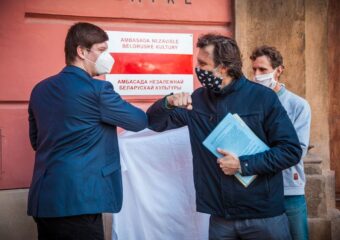
The “embassy” of independent Belarusian culture was launched in The Center for Experimental Theater in Brno, Czech Republic, on 17 November. The aim of the project is to spread awareness of Belarusian culture and protests against the outcome of the rigged presidential election. One of the first activities of the “embassy” is letters from Czech personalities to Belarusian political prisoners. They were written, for example, by Senate President Miloš Vystrčil (ODS) and Chief Conductor and Artistic Director of the Czech Philharmonic Semyon Byčkov.
The ambassador of independent Belarusian culture is the translator Siarhej Smatryčenka, who has Belarusian and Czech citizenship and lives in Brno.
Belarus Free Theatre received the 2020 Magnitsky Human Rights Award for Courage Under Fire for standing up to the Lukashenka regime in the face of torture and murder, but still carry on.
The Finnish PEN and cultural community have recorded a video to support Belarusian colleagues.
“For more than 100 days, Belarusians have been searching for justice. In these difficult circumstances, as violence and oppression continue, we want to express our support for our Belarusian colleagues and the people of Belarus in their protests for freedom.”
Musicians, alumni of the National Gymnasium-College of the Belarusian State Academy of Music, made a video appeal urging to free Maria Kalesnikava and all political prisoners in Belarus as well as to stop the oppression of the Belarusian people.
An exhibition New Belarusian Art has been running at St. Marien Church in the German town Lübeck.
Miscellanious
Many witnesses tell about regular cases of the security forces taking away white-red-white flags at the protests, spreading them on the floor of the police vans and forcing the detainees to walk on them, while policemen themselves step on the flags on purpose as well as throw them in the trash. For similar actions towards the official Belarusian flag one can be sued under Administrative and Criminal Codes.
On November 19, Lukashenka appointed Anatol Markevič as a new Culture Minister, replacing Jury Bondar, who had headed the Ministry of Culture for three years.
Follow this link to donate to the fundraising campaign supported by PEN Belarus.
Download the pdf-version of issue 7 of Cultural Resistance Monitoring.
The newsletter was prepared by the Belarusian PEN Center in cooperation with the Belarusian Cultural Solidarity Fund.
The information partner is the portal TuzinFM.by
